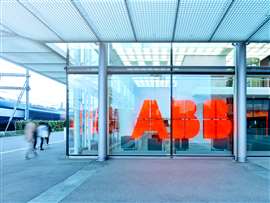Electrifying circularity – A Q&A with ABB’s Mateusz Zajac & Pedro Robredo
08 April 2024
Job sites are looking different every year, and more progress in electrifying the industry seems to happen daily. ABB’s Mateusz Zajac and Pedro Robredo discuss how contractors can take advantage of time and money savings while embracing electric circularity.
 The ABB headquarters in Zurich, Switzerland. (Image: ABB)
The ABB headquarters in Zurich, Switzerland. (Image: ABB)
For Mateusz Zajac, sustainability leader for the electrification service division at ABB, a Swiss-based multinational corporation and OEM that provides electrification and automation solutions for the construction and manufacturing industries, a ‘resource-efficient’ future requires collaborative solutions today.
And demand, today, for circular and sustainable services is at an all-time high.
“We see more and more decision-makers wanting to shift their focus from ‘product’ to ‘value and approach’,” he said, noting clients want to prolong asset lifetime, reduce costs, and cut their carbon footprint, all at the same time.
Avoiding machine failure and maintenance
While government regulation has increased demand for sustainability initiatives in some parts of the globe, Pedro Robredo, ABB’s senior VP in the Americas, said contractors’ interest in sustainability and circularity is also driven by improved, modern solutions.
“With the ability to do remote monitoring and to apply analytics, we can look at those assets and monitor those assets, and now we are able to see things that are either good or bad in terms of the horizon,” said Robredo.
Zajac added electric adoption is made easier when the technology is adept at identifying the machine’s maintenance needs.
 Mateusz Zajac
Mateusz Zajac
Allowing products to reach ‘failure’ instead of keeping up with regular maintenance, he said, can cost upwards of ten-times a timely-scheduled maintenance.
Management monitoring from remote sites
Robredo noted more today can be done offsite. Offerings like remote product management – depending on size and locale of the project – could save owners and managers, in some cases, millions of dollars daily, he added.
Zajac adds these real-time services create real value especially for mining, offshore, or remote construction projects.
“We’re working with the world’s largest mine shipping operators that sometimes need remote maintenance for problem solving of data,” he said. “Augmented reality greatly extends our ability and the ability of onboard technicians to address failures that would have otherwise lacked the experience and expertise to diagnose and complete and would require flying a person remotely to a ship via helicopter in the world’s remote locations.”
One significant issue builders note in the move toward electric machines and components is troubleshooting breakdowns.
But, equipped with advanced technology, Zajac and Robredo say the industry is finding ways to make the entire segment more remote and efficient.
Beyond the data modern tech can produce and log, the actual hardware has also improved so quickly that Robredo (in jest) wondered how a discussion on the topic would look in just ten years.
“Perhaps we will all be in 3D, and we could actually ‘cheers’ with our coffee and our tea,” he jokes, adding sincerely, “it’s evolving in a way we cannot completely predict.”
Originally designed as a device for gaming, augmented reality headsets have made substantial contributions to the construction and industrial industries, Zajac points out. He details a recent project wherein ABB experts aligned with service engineers from a leading pulp and paper producer.
“We helped them use Microsoft HoloLens headsets with our augmented reality technology to guide them on the documentation to help them self-maintain their assets,” he says, noting the hyper-proficiency such technology can provide. “With maintenance issues that would normally require days for travel, troubleshooting, and resolution, it’s now solved in hours.”
Circular operations help labour deficit
Robredo also notes that global electrification has shown promise in reducing the need for highly skilled labour (of which there’s little to go around).
“People with the knowledge are retiring, and new generations are being more digital and not choosing necessarily [the construction] world,” he says, addressing how its far more common for employees to work from home, which isn’t always an option in this industry.
Some elements, he imagines, will need to find ways to deliver more with less while utilising electric components and strategies.
 Pedro Robredo
Pedro Robredo
“It is essential for our ability to service this into the future into the next ten, 20, 30 years, to be able to – not only do remote – but to start using artificial intelligence, to do reporting and quick root-cause analysis of things in real-time in a remote kind-of-way,” says Robredo.
As electrification of the industry finds a consistent footing, perhaps ten-years from now unforeseen technological advances just may leapfrog Robredo’s expectations, and trade workers will be able to fix that breaker from the comfort of their own home.
“I think the move toward leveraging machine learning that feature intelligence and remote tools and the predictive algorithms that go on top of that, that’s going to affect our lives in everything we do,” says Robredo.
STAY CONNECTED




Receive the information you need when you need it through our world-leading magazines, newsletters and daily briefings.
POWER SOURCING GUIDE
The trusted reference and buyer’s guide for 83 years
The original “desktop search engine,” guiding nearly 10,000 users in more than 90 countries it is the primary reference for specifications and details on all the components that go into engine systems.
Visit Now
CONNECT WITH THE TEAM










